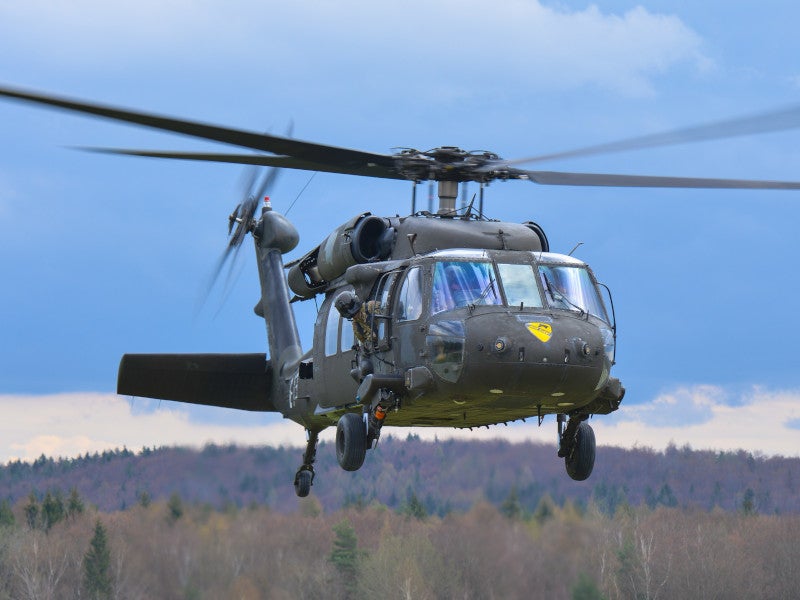UH60 Blackhawk Helicopter: Enhancing Emergency and Crisis Response Capabilities
A Comprehensive Overview to the Capabilities and Background of the UH60 Blackhawk Helicopter
Because its inaugural trip in 1974, the Sikorsky UH-60 Blackhawk has actually developed from a tactical transportation helicopter right into a keystone of military procedures worldwide. Its considerable usage in varied functions-- from battle objectives to altruistic alleviation-- underscores its adaptability and strength. As we discover the Blackhawk's journey and its extensive influence on both war and aid objectives, one could question exactly how arising technologies will certainly shape its future payments to international defense strategies.
Development of the UH-60 Blackhawk: From Principle to Deployment
Officially presented to the Military in 1979, the Blackhawk was a substantial improvement in rotorcraft innovation, including twin engines for higher power and redundancy, a toughened fuselage, and advanced avionics. Its capacity to lug 11 fully geared up troops or a 2600-pound payload highlighted its convenience and enhanced functional abilities. Throughout the years, it has actually been continually upgraded to include the most current in army innovation, ensuring its relevance in modern-day military operations.
Secret Objectives and Functions of the UH-60 Blackhawk in Modern Conflicts

A number of essential missions highlight the UH-60 Blackhawk's essential function in modern-day disputes. Its versatility makes it a property across diverse procedures, consisting of troop transport, clinical discharge, and search and rescue. The Blackhawk's ability to quickly deploy troops right into warm zones, typically under hefty fire, pop over to this web-site exhibits its importance in tactical army engagements. Especially, its use in the 1991 Gulf Battle and succeeding disputes like those in Afghanistan and Iraq highlights its efficiency in battle and non-combat situations alike.
The helicopter additionally plays a crucial function in humanitarian missions. Its ability to operate in severe atmospheres makes it appropriate for supplying help and carrying out catastrophe alleviation procedures worldwide. Additionally, the Blackhawk's flexibility reaches unique operations, where its stealth and dexterity are paramount. It supports night-time raids and hidden insertions, crucial in counter-terrorism and captive rescue circumstances, thus enhancing its crucial condition in modern armed forces approach.
Technical Enhancements and Future Potential Customers of the Blackhawk Fleet

Looking in advance, the future of the Blackhawk fleet appears focused on increasing flexibility and survivability. These developments aim to keep the UH-60 at the leading edge of rotary-wing tactical operations, ensuring its relevance in modern war and altruistic missions for years to this content come.

Final Thought
The UH-60 Blackhawk helicopter has continually shown itself as an indispensable asset in military and humanitarian sectors. From its creation in the 1970s to its pivotal roles in significant international conflicts, the Blackhawk has actually adapted through significant technical developments. As it accepts future upgrades, including prospective autonomous technologies, the Blackhawk is poised to stay an essential device in both defense and help goals, mirroring its enduring value in modern-day procedures worldwide.
Since its inaugural flight in 1974, the Sikorsky UH-60 Blackhawk has evolved from a tactical transportation helicopter into a cornerstone of army procedures worldwide.The UH-60 Blackhawk helicopter, established by Sikorsky Aircraft, started as a visionary task in the early 1970s intended at fulfilling the United state Army's rigorous requirements for a tactical transportation helicopter - uh60 blackhawk helicopter.A number of crucial objectives underscore the UH-60 Blackhawk's vital role in modern-day conflicts.The UH-60 Blackhawk helicopter has continuously shown itself as a vital asset in army and altruistic fields. As it welcomes future upgrades, including prospective autonomous technologies, the Blackhawk is positioned to remain a crucial device in both defense and aid goals, reflecting its long-lasting relevance in contemporary procedures worldwide